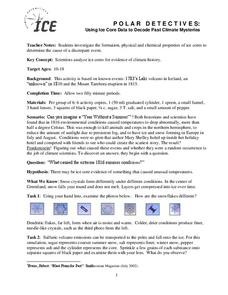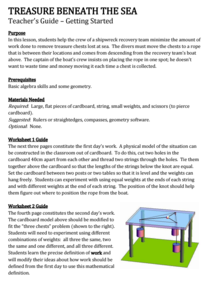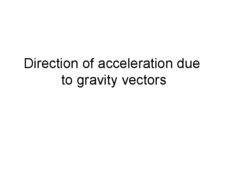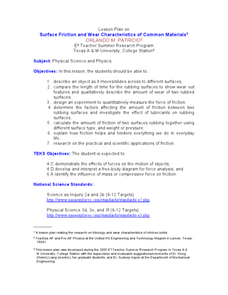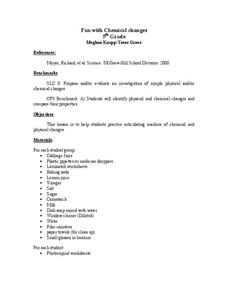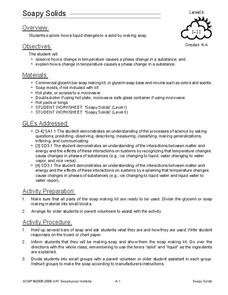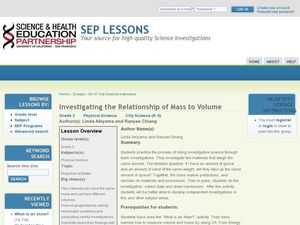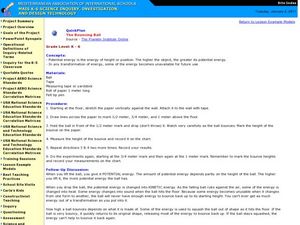Polar Trec
Polar Detectives: Using Ice Core Data to Decode Past Climate Mysteries
How does examining an ice core tell us about weather? Learners set up and explore fake ice cores made of sugar, salt, and ash to represent historical snowfall and volcanic eruptions. From their setups, scholars determine what caused the...
Polar Trec
Arctic Smorgasbord!
Two blooms of phytoplankton, instead of just one, now occur in the Arctic due to declining sea ice, which will have widespread effects on the marine life and climate. In small groups, participants build an Arctic food web with given...
California Mathematics Project
Treasure Beneath the Sea
Explore the geometry of treasure hunting! Learners use geometry to design a treasure recovery strategy. The objective is to create a design that minimizes the amount of work required. Budding mathematicians use properties of triangles as...
Kenan Fellows
Unit 4: Bioethics and the Future of Biotechnology
What's the future of biotechnology? Explore a hot topic in the fourth and final unit in a series of Biotechnology lessons. Learners develop an understanding of the many issues in bioethics, then create an argument for or against the role...
NASA
Christa's Lost Lesson: Effervescence
How are chemical reactions affected by gravity? Learners explore the phenomenon of effervescence as part of the Christa's Lost Lessons series. They compare findings in an experiment on effervescence to a video of a similar experiment in...
Curated OER
Simple Machines III - Pulleys
The principles behind pulleys, levers, and simple machines are the focus of a science instructional activity. In it, learners take part in a whole-class activity. There are two groups of pupils who each must lift objects with fixed...
Curated OER
Are You Full of Hot Air?
Explore the concept of measuring and recording circumference. In this physical science and measurement lesson, young learners blow up balloons, measure the circumference, and record the data on an interactive graphing website.
Curated OER
Build A Borneo Glider!
Young scholars construct a paper glider. In this physics of gliding lesson, students first learn about Borneo and it's rainforest habitat. After young scholars discover the way animals in Borneo glide from tree to tree, they use their...
Curated OER
Resultant Forces
A series of examples and activities about how forces have effects on objects. The data given on each slide includes force magnitudes, particle direction and the questions require the class to calculate the resultant vectors. The...
Curated OER
Direction of Acceleration Due to Gravity Vectors
Many realistic situations of active forces are presented here along with diagrams. The direction of movement, acceleration and gravity are labeled on each picture to help understanding. A summary of the direction of acceleration should...
National Wildlife Federation
Sensory Discovery Walk
Let your senses be your lead. Pairs of pupils blindfold their partners and then lead them around nature areas. They use their senses to find landmarks and create maps with their findings. Once they create their maps, they go back to the...
American Museum of Natural History
Atomic Mobile
Structure an activity around atoms. Learners use their knowledge of the parts of atoms—the protons, neutrons, and electrons—to build a model of a carbon atom. Scholars create a nucleus by using clay balls to represent the protons and...
American Institute of Physics
African American Physicists in the 1960s
Physicists Herman Branson and Tannie Stovall provide young scholars with two very different perceptions of the status of African American physicists in the 1960s. After reading and comparing the bios of these two men, class members read...
Curated OER
Surface Friction and Wear Characteristics of Common Materials
Students identify the factors affecting friction. In this physics lesson, students construct their own rocket car and race them. They graph the average speeds and discuss how lubricants affect friction between rubbing surfaces.
Curated OER
Evidence of Chemical Change
In this chemical change worksheet, students conduct 4 experiments set up around the room. They follow the instructions at each station for each experiment and list the physical properties and observe any changes at each station. Students...
Curated OER
Chemical Changes
Fourth graders examine and identify chemical and physical changes in a variety of substances. They observe a vinegar and baking soda demonstration, and a water, laundry detergent, and Epsom salt mixture demonstration. They discuss the...
Curated OER
Fun With Chemical Changes
Fifth graders observe and identify the differences between chemical and physical changes. In small groups they mix different substances together in glass beakers, and identify which had a chemical change, supporting their statements...
Curated OER
Chemical Fun
Fifth graders observe and conduct a variety of experiments to differentiate between physical and chemical changes. They mix cabbage juice with different liquids and record their observations on a chart. Students write down their...
Curated OER
Soapy Solids
Young scholars observe and explain how a change in temperature causes a physical change in a substance. In this physical science lesson plan, students use a soap making kit to observe the effects of adding heat to the bar soap as they...
Curated OER
Investigating the Relationship of Mass to Volume
Third graders explore the relationship of mass to volume. In this physical science lesson, 3rd graders participate in an investigation with a several materials and measure the mass and volume using scientific tools. Students discuss and...
Curated OER
Hot and Cold Colors
Young scholars examine how temperature effects changes in materials. In this physical science lesson, students use food coloring and cups of water of varying temperatures to observe the effects temperature has on matter. Young scholars...
Curated OER
String Telephones and Musical Straws
Fourth graders investigate pitches of sound. In this physical science lesson, 4th graders participate in two activities that help them explore pitch--one activity has them working with string telephones and the amount of tension applied...
Curated OER
Magnets
Students complete a series of experiments using magnets. In this physical science and magnetism lesson, students first predict and test the magnetic properties of various objects, then students determine if the size of a magnet impacts...
Curated OER
The Bouncing Ball
Students use the scientific method to conduct an experiment to test how a ball bounces. In this inquiry-based physical science and scientific method lesson, students drop a ball from specified heights and record the rebound, then record...


